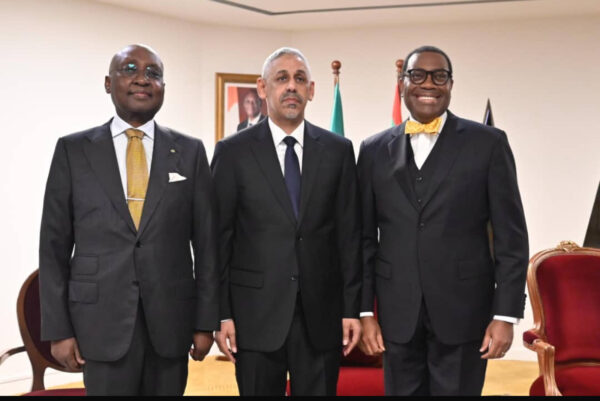On September 1, 2025, will be remembered as a special day in the history of the African Development Bank (AfDB). During a solemn swearing-in ceremony, rich in emotion, the new president Sidi Ould Tah paid tribute to the two heads of state present – the President of the Republic of Côte d’Ivoire and the President of the Islamic Republic of Mauritania – before congratulating his predecessors, Donald Kaberuka and Akinwumi Adesina, two figures who have marked the last twenty years of the institution. Beyond the excitement of this day, a new era now opens, full of immense challenges and urgent reforms.
Restore staff confidence and operational efficiency
In his inaugural address, Sidi Ould Tah stressed the importance of the Bank’s human capital, “the most precious resource.” Since the Covid-19 pandemic and the widespread use of remote work, a demotivating atmosphere and paralyzing bureaucracy have weakened internal dynamics. The proliferation of central and regional departments, as well as vice-presidential and “special representatives” positions, has complicated the organizational chart without improving efficiency.
This has resulted in a “Mexican army”: too many generals, too many parallel structures, but a demoralized body of soldiers. Increased use of external consultants has not restored project momentum, while delays in approval and disbursement procedures have significantly reduced operational impact.
The new president’s first task will therefore be to optimize staffing and deeply reorganize operating methods, with a clear objective: to build a more agile, more operational Bank capable of quickly responding to the needs of its member countries.
Rebuild the African Development Fund and mobilize resources
The second crucial task will be the replenishment of the African Development Fund (ADF), scheduled for next October. The most decisive partners of the Bank, who were put off during Adesina’s second term, have kept their distance, weakening resource mobilization.
Sidi Ould Tah must reassure, restore confidence, and convince strategic donors, especially the United States, to release their commitments. Despite announcing the freezing of their contribution to the ADF, Washington cannot afford to give up its position as the largest non-regional shareholder, especially as China, Brazil, and Saudi Arabia are rapidly advancing. A compromise is still possible.
At the same time, a strategic dialogue with shareholders will be needed to transform announced subscriptions into effectively paid-up capital, and to broaden the shareholder base to include large African and emerging countries, while preserving the voice of smaller states.
Stabilize the Bank’s headquarters
The issue of the headquarters is another sensitive matter. The historic building in Abidjan, renovated at great expense, is unusable due to asbestos. The CCIA building, made available by the Ivorian state, now incurs high costs. With the pharaonic project of a new $700 million headquarters partly rejected, the new president will have to find a pragmatic and sustainable solution. The image and stability of a leading institution on the continent are at stake.
Revive impact: infrastructure, private sector, job creation for youth, and support for SMEs
The mission of any financial institution is financing. However, recent years’ experience has shown the limits of the “High Five” strategy, which, by trying to address multiple fronts simultaneously, diluted the impact. The AfDB must refocus on clear and measurable priorities.
It is urgent to increase the annual funding level, surpassing the current $5 billion disbursement. This requires a drastic acceleration of project analysis processes and support for countries. Beneficiaries can no longer wait years to see vital projects materialize.
Furthermore, the AfDB must swiftly return to funding basic infrastructure, as well as play a leading role in supporting the private sector and entrepreneurship, with a particular focus on:
– Massive job creation for youth,
– Financing small and medium enterprises, true engines of growth and industrialization,
– An innovative combination of traditional, climate, ESG, and ethical financing (including Islamic finance).
As the new President emphasized in his speech: “Africa is watching us; youth is waiting for us; it is time for action!”
This is the price the AfDB must pay to contribute to transforming Africa’s demographics into a true economic dynamic.
Build a new African financial architecture
Beyond internal reforms, the future of the AfDB lies in its ability to fit into a new African financial architecture. The institution must once again become the reference actor in financing the continent, not alone, but in partnership with its partners and specialized institutions: Africa50, Afreximbank, BADEA, BOAD, BIDC, Africa Guarantee Fund, ATIDI, the World Bank, IFC, and others.
It is no longer about constantly soliciting shareholders for funds, but about optimizing available capital, using leverage effects, guarantees, insurance, and working closely with commercial banks, whose understanding of local risks is more nuanced.
Moreover, the AfDB must become a proactive player in developing African financial markets. Instead of confining its investments to prudent cash management, focused on low-risk instruments from Northern countries, the institution must contribute to animating African stock exchanges, stimulating green and ESG financing, and creating a true Active Management AfDB.
As Sidi Ould Tah stated during his campaign, every dollar of capital can be transformed into ten dollars of financing through intelligent leverage effects. This ambition must become a reality.
A roadmap for the first 100 days
The first hundred days will be decisive. They will likely be dedicated to listening, consulting, receiving reports, building a strong team, and gradually correcting his vision of the “four cardinal points.” Faced with the immensity of the tasks, the method must be clear:
– Establish a governance based on meritocracy;
– Minimize travel until internal confidence is restored;
– Set a strategic direction and delegate effectively, like a general who guides and entrusts trenches to his officers.
The AfDB does not need an omnipresent president but a leader capable of outlining a vision, building coalitions, and restoring a culture of performance in the service of Africa.


